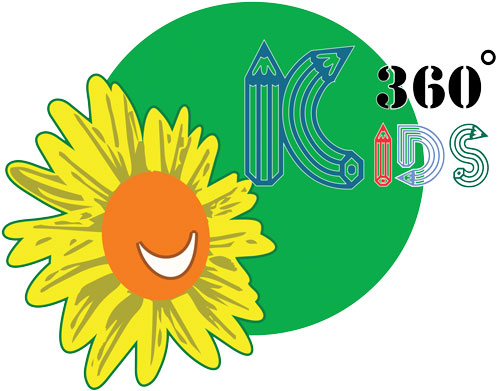Development of Reading and Writing
Learning to read and write is essential for success in school and later life. Our teachers are knowledgeable about the stages of literacy development and use this understanding to plan and assess literacy programs.
Stages of Literacy Development
- Mimicking Reading: Understanding what reading is and how it works.
- Understanding Print: Learning that spoken words can be written down and that print and books have a specific structure.
- Phonological Awareness: Recognizing rhyming words and words that start or end similarly.
- Communicating Through Writing: Using writing to convey messages, starting with pictures, symbols, and familiar words.
- Phonemic Awareness and Phonics: Using approximate spelling based on sound identification and letter-sound correspondence.
Learning Through Explicit Instruction
Explicit instruction at 360° Kids Play School involves clear, direct teaching and modeling of specific concepts, skills, and strategies. This approach is used in various settings, including large groups, small groups, and individual activities.
Steps of Explicit Instruction
- Explanation: The teacher explains the strategy, its purpose, and appropriate usage.
- Modeling: The teacher demonstrates the strategy during activities like modeled reading.
- Guided Practice: Children practice the strategy with teacher support during shared reading or independent activities.
Strategies for Developing an Effective Literacy Environment
Creating a literacy-rich environment motivates children to learn the functions and features of print. Teachers use various strategies to foster literacy skills and encourage independent reading and writing.
Key Strategies
- Listening and Responding: Providing frequent opportunities for children to listen to and respond to stories, poems, songs, and rhymes.
- Modeling Literacy Skills: Teachers think aloud to model beginning reading and writing strategies.
- Interactive Learning: Encouraging children to repeat words, name characters, and identify signs, labels, names, letters, and letter sounds.
- Higher-Order Thinking: Promoting metacognition and critical thinking through questions, discussions, and information classification.
- Independent Activities: Providing materials and opportunities for free exploration, focused exploration, and guided activities.
Implementing Literacy Activities
Teachers plan literacy activities based on their knowledge of the stages of development in oral language, reading, and writing. They provide appropriate materials and create a supportive environment where children can explore and develop their literacy skills.
Example Activities
- Reading Stories: Engaging children with stories that incorporate mathematical concepts.
- Dramatizing Poems: Acting out number poems or stories to connect with mathematical ideas.
- Interactive Writing: Encouraging children to express their thoughts and ideas through writing and drawing.
- Exploratory Play: Using concrete materials to explore mathematical and literacy concepts.
Conclusion
At 360° Kids Play School, we create a rich, engaging environment that supports language development and literacy. Through a combination of oral language activities, explicit instruction, and a literacy-rich environment, we help children build the foundational skills necessary for reading, writing, and critical thinking. Our approach ensures that every child is given the opportunity to thrive and succeed in their early educational journey.

